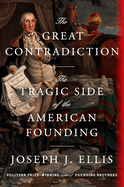
Historian Joseph J. Ellis (Founding Brothers; The Cause) takes on the creation of the United States and the Constitutional Convention in The Great Contradiction: The Tragic Side of the American Founding. He discusses the contemporary tendency to place Washington, Jefferson, and other founders on pedestals and focuses on their two enormous failures: the violent displacement of Native Americans and the continued brutal enslavement of hundreds of thousands of Africans.
Ellis argues that a significant reason why the founders avoided the questions of slavery and land seizures is that "moral blindness made eminent economic sense." Thus from the beginning, the U.S. ignored the advice of Benjamin Franklin to put slavery on the national agenda, resulting in the Civil War and centuries of racism and injustice. Similarly, for the Native American populations of the new United States, victory in the American Revolution "proved an unmitigated calamity," setting the republic on a path that ultimately culminated in the Indian Removal Act of 1830.
Leaning on new research about the Atlantic Slave Trade and primary documentation from the previous books he has written, Ellis covers these contested historical origin stories in fresh and intriguing ways. The Great Contradiction pulls no punches about the flaws of the founding fathers: "Next to the failure to end slavery, or at least put it on the road to extinction, the inability to reach a just accommodation with the Native Americans was the greatest failure of the revolutionary generation. And they knew it." Fans of U.S. history--or those who recognize "the presumption of white supremacy that had its origins and first chapter in the American founding"--are sure to appreciate The Great Contradiction. --Jessica Howard, former bookseller, freelance book reviewer

